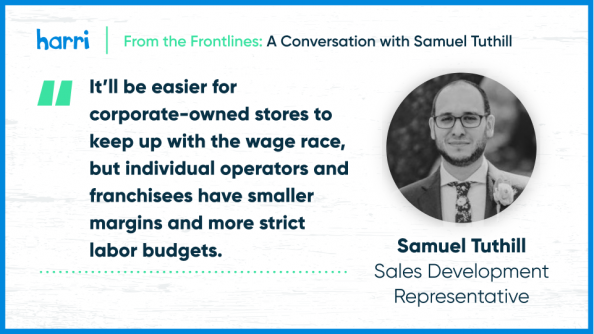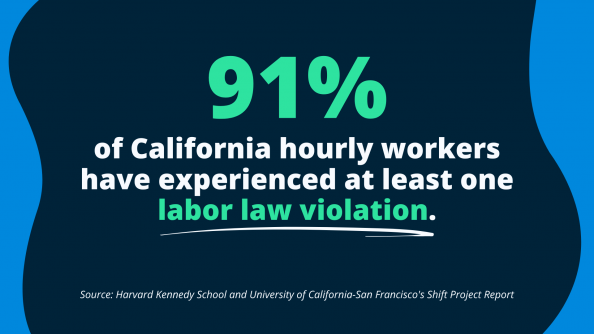The Compliance Countdown: Your 4-Step Checklist to De-Risk

- By Harri Insider Team | November 11, 2025
The rules of employment are changing, and for hospitality, that means one thing: the time for reactive management is over. We recently sponsored a vital breakfast briefing hosted by The Caterer where industry champions from UK Hospitality to the people leaders at The Belfry and RedCat Pub Co. met to unpack the complex, costly, and consequential legal roadmap ahead.
Here is the strategic breakdown of what’s coming and the operational shifts you need to implement now.
1. The Two-Year Cost Headwind: Sick Pay & Financial Pressure
The first major wave of legislation hitting in April 2026, specifically the changes to Statutory Sick Pay (SSP) will deliver a significant cost challenge.
- SSP from Day One: The waiting period will be abolished, meaning employers will shoulder the cost of absence from the first day of sickness. Furthermore, the lower earnings limit will be removed, extending SSP eligibility to all employees, including the lowest-paid.
- The Commercial Reality: As Lee Milton of RedCat Pub Co. noted, every business includes SSP in its financial forecasting. This change, coupled with successive National Living Wage increases, creates a massive burden.
- The Managerial Shift: As Kirsten Price of The Belfry Hotel and Resorts highlighted, the focus must shift from merely accepting high absence rates to tackling the root causes. Use technology to facilitate employee-built rotas and true flexibility, then educate managers on the commercial impact of absence to change behaviour.
Our Takeaway: Businesses must stop seeing sick pay solely as an HR issue and start viewing it as a massive P&L line item. Strategic investment in wellness and flexible scheduling is the only way to mitigate this cost.
2. The Day One Rights Debate: Hiring with Certainty
Perhaps the most discussed, and debated, change is the proposed shift to Day One unfair dismissal rights.
Currently, the two-year qualifying period gives employers space to assess new hires. This new approach, while noble in intent, creates a risk for an industry built on giving people a chance.
- The Danger of Caution: As UK Hospitality’s David Sheen explained, the worry is that operators will become overly cautious and less likely to take a risk on the entry-level or less-experienced candidates that the sector is famous for hiring.
- The Light Touch Dilemma: Government proposals include a “light-touch” dismissal process during a statutory probationary period (potentially up to nine months). However, until the detail is confirmed, it is the ambiguity that is most challenging.
The Administrative Solution: The solution isn’t legal, it’s procedural. Managers are not born great administrators, but the law requires documentation. Investing in training and simple performance management tools that ensure easy, documented, and frequent feedback during the probation period is now non-negotiable.
3. Predictability of Shifts: Balancing Compliance and Flexibility
The legislation aims to tackle ‘one-sided flexibility’ with changes to zero-hour contracts and a push for greater shift predictability (with notice periods and compensation for last minute cancellations).
- The Hospitality Conundrum: Hospitality thrives on quick adaptability, from event catering to a sudden rush on a sunny day. Mutual flexibility is what team members often value most.
- The Tech Imperative: Dan Maimone CX Experience at Harri pointed out that the US experience with similar ‘Fair Scheduling’ laws proves that everything must be documented and agreed upon with ease. You need systems that allow for swift, transparent shift swapping and accurate, data-driven forecasting.
- The Next Step: As an industry, we must aim for a minimum standard of a 14 day rota notice. Anything less forces reactive management. By improving internal communication and using technology to forecast more accurately, operators can provide greater certainty without losing the operational agility they need.
4. The Cultural Imperative: Preparation is Everything
The panel was unanimous: waiting for the full legislative detail is a massive mistake. Leaders must start preparing now.
Legislative Focus | What to Do Today |
SSP & Cost Control (From April 2026) | Review absence data to find root causes. Invest in flexible scheduling and wellness initiatives to drive down voluntary absence. |
Day One Rights (Expected 2027) | Audit manager training. Ensure managers are having regular, documented coaching conversations, not just six-month appraisals. |
Sexual Harassment (Third-party protection) | Review existing policies. Ensure your training covers manager intervention for customer-on-employee harassment. |
The Harri Takeaway: Raise the Bar
While the legislation presents challenges, it offers a single, undeniable benefit: it raises the minimum employment standard across the sector, making it a fairer place to work.
The best employers are already doing this. For the rest, this is your chance to get ahead of the curve. The new game plan isn’t about simply surviving regulation; it’s about leveraging technology and best practices to redefine what GREAT employment looks like in hospitality; fair, flexible, and future-ready.





















